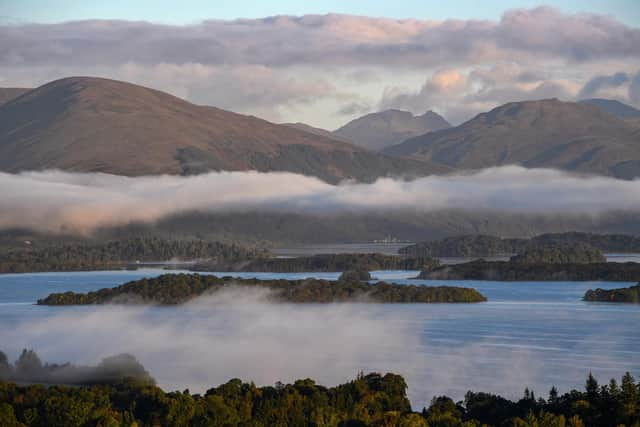Scottish Greens' influence in government means every planning decision in Scotland should now make it a more sustainable country – Mark Ruskell MSP


That’s why the new National Planning Framework (NPF), published this week, is a really important vision for how Scotland might look in ten years’ time or more.
This draft framework from the Scottish government isn’t exactly as I would have drafted it, but it is a step change from what has come before. Previous strategies have been clear that new fossil fuel power stations should be approved. They have listed major road projects as national priorities.
Advertisement
Hide AdAdvertisement
Hide AdThis time, the new National Planning Framework is an important shift in priorities that demonstrates the value of Greens in government.
It really does have the climate emergency as a point of focus.
The strategy over the next decade is to “transform the way we use our land and buildings so that every decision we make contributes to making Scotland a more sustainable place”.
What that means is that the key priorities we put into the cooperation deal between the Scottish Greens and government should be embedded in every planning decision.
This paves the way for a massive expansion in renewable energy, with a doubling of the capacity for onshore wind, allowing wind farms to upgrade their turbines to new more efficient models.


There’s also positive stuff in there about supporting smaller scale, community-run renewables schemes and recognising the huge potential we have in marine energy like tidal.
Of course, I have some reservations about an over-reliance on hydrogen, which is frequently held up by the fossil fuel industry as a way of keeping the gas supply running.
For example, given the shift in the NPF towards building a green future for Scotland, powered with renewable energy, we have doubts about whether replacing the gas facility at Peterhead is even needed now, especially given the economic uncertainties about carbon capture and storage.
Advertisement
Hide AdAdvertisement
Hide AdThankfully, I think this strategic vision should give the green light for Scotland to power ahead using our strengths in renewable energy.
The NPF also provides a clear pathway for tripling the budget for walking and cycling to at least £320 million, or ten per cent of the total transport budget, as pledged in our cooperation agreement. Indeed, a national walking, cycling and wheeling network is the second national development listed in the framework.
This isn’t just about cycle lanes in our cities, it’s about building a national network that allows short and longer distance journeys to made without the use of a car. Modernising and decarbonising our railways is also a priority, and vital if we are going to allow people to reduce the use of private cars.
What is very exciting for me is the recognition in this framework of how important Scotland’s green spaces and nature restoration is, with clear objectives into which we can channel the £55 million nature restoration funding announced last Saturday.
Protecting nature isn’t just about protecting Scotland’s natural beauty and encouraging tourists.
Biodiversity is absolutely essential to our survival and an integral part of tackling the climate emergency too, with forests and peatlands essential for capturing carbon from the air. But it has been in sharp decline in Scotland, with one in nine species under threat, and this has to be recognised in our planning decisions.
This is about protecting and restoring natural places and networking them together, making it much harder to approve destructive developments in places like national parks.
It will mean limiting urban expansion and better protections for green belt and other green spaces, with a focus instead on brownfield developments and repurposing derelict buildings and vacant land.
Advertisement
Hide AdAdvertisement
Hide AdWe will also have to adapt to the impacts of climate change that are already locked in, including increased flood risk, water scarcity, environmental change, coastal erosion, impacts on forestry and agriculture, extreme weather events, and risks to health, food security and safety.
And the planning framework also changes how we think about towns too. Greener living is healthier living, which is why planning has to be about creating spaces that are good for people’s well-being. For far too long, decisions have led to our towns and cities being full of polluting traffic jams and peripheral housing estates miles away from anything. That needs to change.
Instead of cars, we need to focus on people.
The idea of a 20-minute neighbourhood – where vital services, shops and other assets are within easy reach – is one which will mean different things in urban and rural settings, but the point of it is to improve community spirit and limit the need for car journeys. By bringing nature back into cities, we can give everyone access to green space.
The National Planning Framework is a draft strategy, a signal of intention, but it will require collaboration to succeed. It will need councils and communities to recognise the ambition and feed it into place plans. It will need engagement in the consultation so that large-scale developers don’t have more of an input than the communities that will be affected.
Responding to the consultation is an opportunity to shape Scotland’s future and ensure that we move away from the mistakes of the past and focus on our economic, social and environmental well-being. I encourage you to do so.
Mark Ruskell is a Scottish Green MSP for Mid-Scotland and Fife and his party’s spokesperson on environment, climate, energy, transport and culture
A message from the Editor:
Thank you for reading this article. We're more reliant on your support than ever as the shift in consumer habits brought about by coronavirus impacts our advertisers.
If you haven't already, please consider supporting our trusted, fact-checked journalism by taking out a digital subscription.
Comments
Want to join the conversation? Please or to comment on this article.